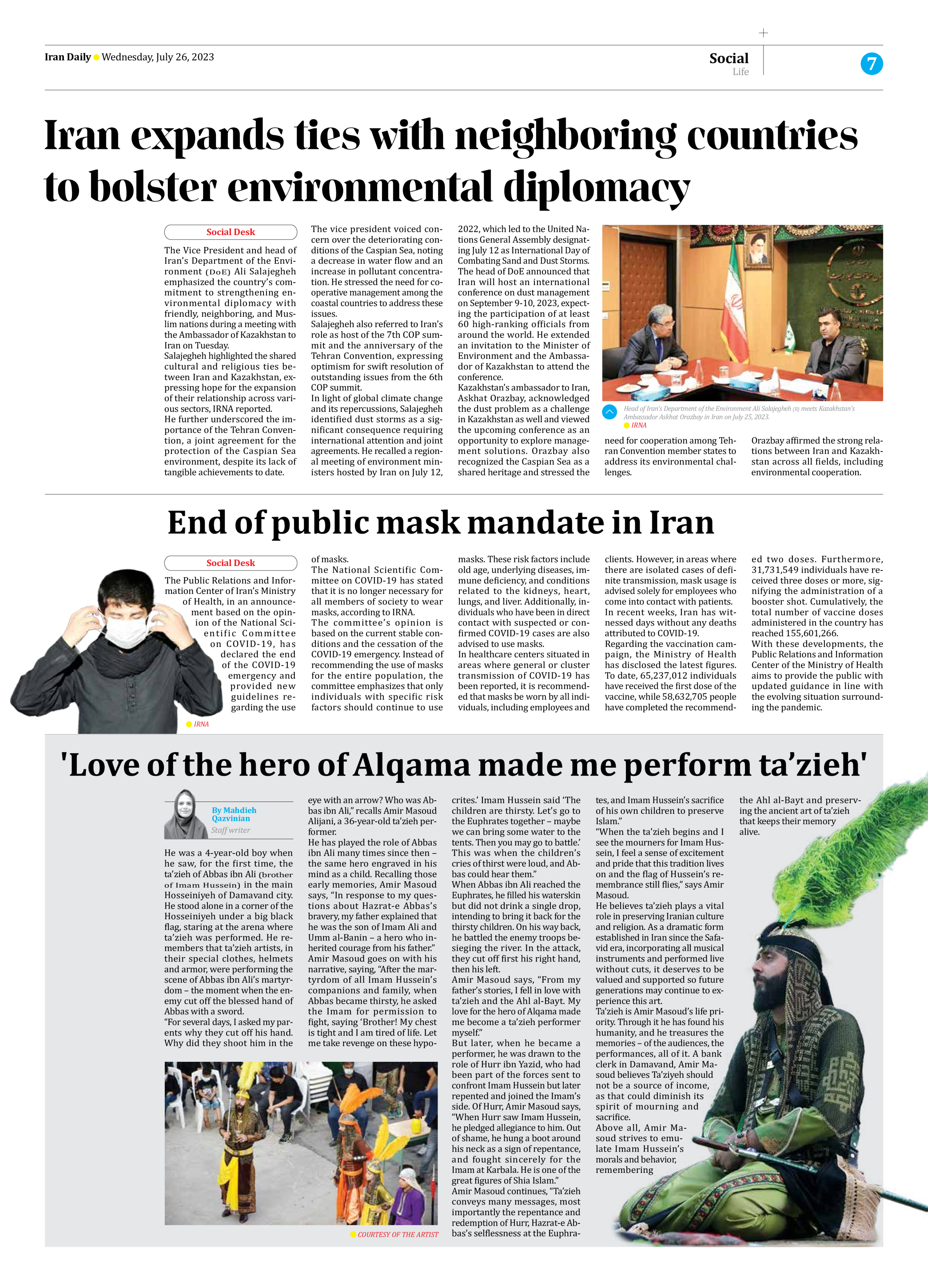
’Love of the hero of Alqama made
By Mahdieh Qazvinian
Staff writer
He was a 4-year-old boy when he saw, for the first time, the ta’zieh of Abbas ibn Ali (brother of Imam Hussein) in the main Hosseiniyeh of Damavand city. He stood alone in a corner of the Hosseiniyeh under a big black flag, staring at the arena where ta’zieh was performed. He remembers that ta’zieh artists, in their special clothes, helmets and armor, were performing the scene of Abbas ibn Ali’s martyrdom – the moment when the enemy cut off the blessed hand of Abbas with a sword.
“For several days, I asked my parents why they cut off his hand. Why did they shoot him in the eye with an arrow? Who was Abbas ibn Ali,” recalls Amir Masoud Alijani, a 36-year-old ta’zieh performer.
He has played the role of Abbas ibn Ali many times since then – the same hero engraved in his mind as a child. Recalling those early memories, Amir Masoud says, “In response to my questions about Hazrat-e Abbas’s bravery, my father explained that he was the son of Imam Ali and Umm al-Banin – a hero who inherited courage from his father.”
Amir Masoud goes on with his narrative, saying, “After the martyrdom of all Imam Hussein’s companions and family, when Abbas became thirsty, he asked the Imam for permission to fight, saying ‘Brother! My chest is tight and I am tired of life. Let me take revenge on these hypocrites.’ Imam Hussein said ‘The children are thirsty. Let’s go to the Euphrates together – maybe we can bring some water to the tents. Then you may go to battle.’ This was when the children’s cries of thirst were loud, and Abbas could hear them.”
When Abbas ibn Ali reached the Euphrates, he filled his waterskin but did not drink a single drop, intending to bring it back for the thirsty children. On his way back, he battled the enemy troops besieging the river. In the attack, they cut off first his right hand, then his left.
Amir Masoud says, “From my father’s stories, I fell in love with ta’zieh and the Ahl al-Bayt. My love for the hero of Alqama made me become a ta’zieh performer myself.”
But later, when he became a performer, he was drawn to the role of Hurr ibn Yazid, who had been part of the forces sent to confront Imam Hussein but later repented and joined the Imam’s side. Of Hurr, Amir Masoud says, “When Hurr saw Imam Hussein, he pledged allegiance to him. Out of shame, he hung a boot around his neck as a sign of repentance, and fought sincerely for the Imam at Karbala. He is one of the great figures of Shia Islam.”
Amir Masoud continues, “Ta’zieh conveys many messages, most importantly the repentance and redemption of Hurr, Hazrat-e Abbas’s selflessness at the Euphrates, and Imam Hussein’s sacrifice of his own children to preserve Islam.”
“When the ta’zieh begins and I see the mourners for Imam Hussein, I feel a sense of excitement and pride that this tradition lives on and the flag of Hussein’s remembrance still flies,” says Amir Masoud.
He believes ta’zieh plays a vital role in preserving Iranian culture and religion. As a dramatic form established in Iran since the Safavid era, incorporating all musical instruments and performed live without cuts, it deserves to be valued and supported so future generations may continue to experience this art.
Ta’zieh is Amir Masoud’s life priority. Through it he has found his humanity, and he treasures the memories – of the audiences, the performances, all of it. A bank clerk in Damavand, Amir Masoud believes Ta’ziyeh should not be a source of income, as that could diminish its spirit of mourning and sacrifice.
Above all, Amir Masoud strives to emulate Imam Hussein’s morals and behavior, remembering the Ahl al-Bayt and preserving the ancient art of ta’zieh that keeps their memory alive.
me perform ta’zieh'







